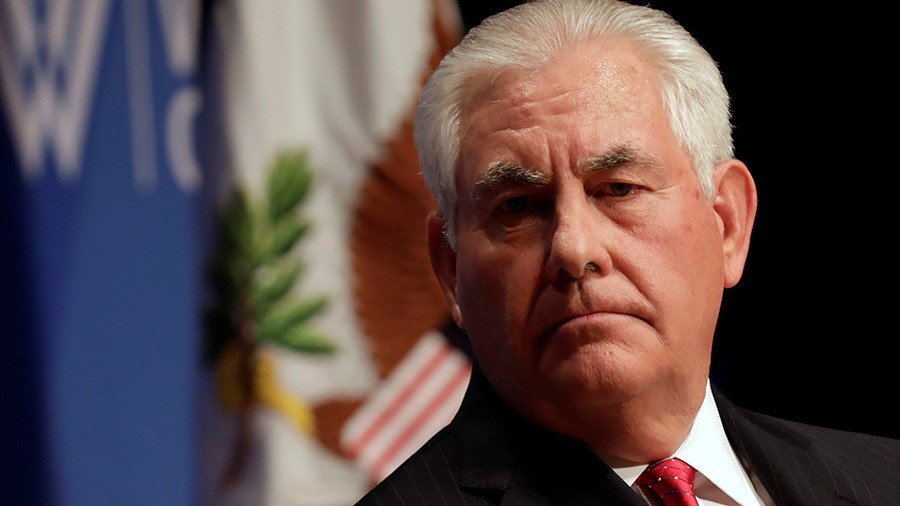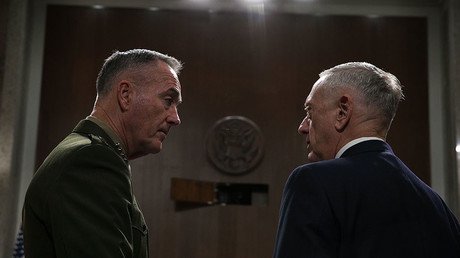Tillerson accuses Russia of using nukes to 'assert global dominance'

US Secretary of State Rex Tillerson accused Russia of using nuclear weapons to establish a new post-Soviet global balance of power and revive the Cold War threat. It is not yet time for US cooperation with Russia on counterterrorism, he added.
Speaking at the Woodrow Wilson Center in Washington DC on Tuesday, Tillerson said that Russia is using its nuclear arsenal to “impose its will on others by force.” As examples of this behavior, he cited the “invasions” of Georgia in 2008 and Crimea in 2014.
“With the end of the Cold War, the imminent threat that everyone faced for that 70 year period was now diminishing. What we now realize is it didn’t,” he said. “It’s still defining itself; It’s still searching for its role in the name of Russia.”
Secretary Tillerson at @TheWilsonCenter: We, together with our friends in Europe, recognize the active threat of recently resurgent #Russia. pic.twitter.com/S80Goa3oPa
— Department of State (@StateDept) November 28, 2017
Tillerson also criticized Russia for assisting the Syrian government – which, he said, showed “disregard for their own citizens” – in its battle against Islamic State, Al-Qaeda, and other terrorist groups.
Russia intervened in Syria in 2015 after a US-backed proxy war brought the Syrian government to the brink of collapse. Russian and Syrian forces, along with the Lebanese Hezbollah group, reversed the trend and have nearly defeated the terrorist insurgents, including Islamic State (IS, formerly ISIS/ISIL).
Despite alleging a Russian agenda of global dominance, Tillerson said that the US and Russia are working together to defeat Islamic State.
“With respect to Russia, there are areas of mutual cooperation. We’re working hard in Syria to defeat ISIS and we’re on the cusp of having ISIS once and for all defeated in Syria,” he said.
While Russia has assisted the Syrian military campaign, the US has backed a Kurdish-led separatist militia under the banner of the Syrian Democratic Forces (SDF).
Tillerson said that Russia is eager to cooperate with the US on counterterrorism efforts, but the Trump administration has declined to pursue those options.
“There are many areas of cooperation with Russia, and they have many others they’d like to work with us on. We just don’t think it’s time to do that,” he said.
The US may be interested in cooperating with Russia in Afghanistan, where Washington’s longest-ever war has failed to achieve its stated goals, Tillerson said.
“There may be opportunities for cooperation in Afghanistan. We’ve not yet come to what that might be but we’re talking about it,” he said. The secretary also called on US allies in NATO to “maintain their commitment to Afghanistan.” After criticizing the war as a candidate, in October President Donald Trump recommitted the US to maintaining a military presence in Afghanistan for an indefinite period of time.
In addition to calling on NATO members to maintaining a military presence in Afghanistan, Tillerson called on NATO allies to spend 2 percent of their gross domestic product (GDP) on their military. He praised Albania, Croatia, France, Hungary and Romania for their newly stated commitment to reach the benchmark.
The emergence of Islamic State-affiliated groups in west Africa demonstrates that the global war on terror “will continue to have new and unexpected origins,” Tillerson said. “We must take action so that areas like the Sahel or the Maghreb do not become the next breeding ground for ISIS, Al-Qaeda or other terrorist groups.”
The US has committed “up to $60 million” in an effort to assist the G5 joint Sahel force to combat terrorism in Africa, Tillerson revealed. Islamist insurgencies sprouted in the region only after NATO-backed rebels deposed the Libyan government in 2011.













